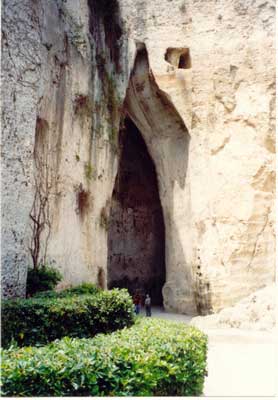|
|
The tyrant Dionysius being afraid to trust himself in the barber's hands, made his daughters learn to shave him. When they grew up, he dared not trust even them with a razor, but made them burn off his beard and hair with red-hot nut-shells. Franc W. Nicolson Dionysius ( ) (c. 432-367 BC), tyrant of Syracuse, began life as a clerk in a public office, but by courage and diplomacy succeeded in making himself supreme. He carried on war with Carthage with varying success; his attempts to drive the Carthaginians entirely out of the island (Sicily) failed, and at his death they were masters of at least a third of it. He also carried on an expedition against Rhegium and its allied cities in Magna Graecia. In one campaign, in which he was joined by the Lucanians, he devastated the territories of Thurii, Croton and Locri. After a protracted siege he took Rhegium (386), and sold the inhabitants as slaves. He joined the Illyrians in an attempt to plunder the temple of Delphi, pillaged the temple of Caere on the Etruscan coast, and founded several military colonies on the Adriatic. In the Peloponnesian War he espoused the side of the Spartans, and assisted them with mercenaries. He also posed as an author and patron of literature; his poems, severely criticized by Philoxenus, were hissed at the Olympic games; but having gained a prize for a tragedy on the Ransom of Hector at the Lenaea at Athens, he was so elated that he engaged in a debauch which proved fatal. According to others, he was poisoned by his physicians at the instigation of his son. His life was written by Philistus, but the work is not extant. Dionysius was regarded by the ancients as a type of the worst kind of despot--cruel, suspicious and vindictive. Like Pisistratus, he was fond of having distinguished literary men about him, such as the historian Philistus, the poet Philoxenus, and the philosopher Plato (c. 388 BC who visited Dionysius I also as a teacher of his son Dionysius II), but treated them in a most arbitrary manner.
Ear of Dionysius (Source) The Ear of Dionysius in Syracuse is named after Dionysius. The name of his son Dionysius II is most well known for the legends of Damocles See Diod. Sic. xiiL, xiv., xv.; J Bass, Dionysius I von Syrakus (Vienna, 1881). Retrieved from "http://en.wikipedia.org" Historical / Fantasy Novels
 |
|
|||||||||||||||||
